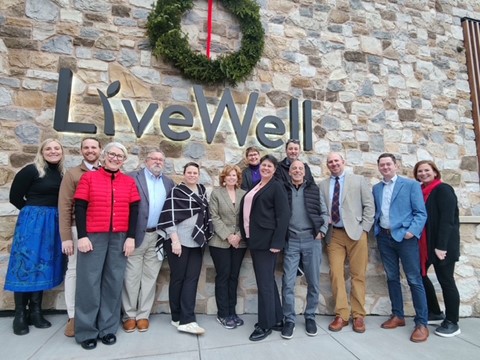Author:
Kim Warchol, President and Founder of DCS at CPI

Author:
Kim Warchol, President and Founder of DCS at CPI
April is Occupational Therapy Month
I want to take a moment to celebrate occupational therapy (OT). As I write this blog, I am proudly wearing my OT conference t-shirt (a treat for myself) that reads, “Inspiring Hope- Changing Lives- Occupational Therapy”. Oh, and I got a second one that reads, “I got you! – Occupational Therapy”. Yep, I am an OT geek.
I am grateful I found the profession back in the mid 80’s because being an OT specializing in dementia care has been one of the bedrocks of my life happiness. My cup has been filled with purpose and passion for many years because I have been able to experience life looking through the lens of OT and working as an OT.
Let’s take a moment to imagine the amazing impact of OT by personalizing how this profession would be there for you if you were facing life with a cognitive challenge:
- What if you were a vibrant young adult- a new wife and Mom and a professional just a few years into your career. Your life is exciting and fulfilling and overflowing with responsibilities. Suddenly you are in a car accident and experience a brain injury.
- Or what if you were a thriving older adult- recently retired and the matriarch of a big family. As the sun sets on your beloved career, your new life chapter is just beginning. You have an ambitious plan of jet setting adventures, hobbies, granny nanny, and other volunteer activities. You are just getting started when you become aware of your Alzheimer’s disease diagnosis.
In both scenarios you are thrust into a life of uncertainty with a fear of dependence and suffering. Who would be there to help you to regain or optimize your independence through cognitive rehabilitation or habilitation? Who would focus on YOU, seeing your care as far more than a diagnosis with a standard protocol, enabling you to do what you want and need to do every day. Who would help you to live the quality life YOU desire? OT- that’s who!
About OT in Dementia Care
The Occupational Therapy Practice Guidelines for Adults Living with Alzheimer’s Disease (AD) and Related Neurocognitive Disorders (NCDs) states, “Occupational therapy practitioners are positioned throughout the health care system to address the diverse needs of adults living with AD and related NCDs and their care partners.”
When I think of OT, I think of helping those with disabilities to fulfill their potential and to live a life of quality, no matter what challenges they face. We help to optimize function, safety, quality of life and health. In my career I have focused almost exclusively on enabling those living with Alzheimer’s disease and other dementias to thrive. We do this by understanding the whole person, their wants and needs, their challenges and abilities, and adapting everything to match their ability level. We optimize what they CAN DO and create supportive environments and people (e.g. loved ones, care partners, society, etc.).
A successful OT working in dementia care will possess deep knowledge in functional cognition, functional cognitive assessment, the cognitive levels/dementia stages, and nonpharmacological behavior prevention and intervention.
As examples we:
- Get to know the person and apply personhood to goal setting and treatment intervention.
- Use tools such as the Global Deterioration Scale, MoCa, and Allen Cognitive Disabilities Model to assess cognition and determine cognitive level or dementia stage.
- Create realistic goals and treatment plans to optimize and/or maintain function for each cognitive level/dementia stage.
- Use direct and/or indirect treatment interventions including training the person and/or their care partners, creating task equivalence, and modifying the environment.
- Know how to prevent distress behaviors by proactively addressing root causes and know how to calm and maintain safety through de-escalation and safety strategies.
As a result, we are able to help the person with the disease, their caregivers and loved ones because we:
- Lift the forgotten.
- Inspire confidence and hope.
- Foster independence.
- Deliver quality of life.
- Create protection from lurking hazards.
I’m honored to be an OT. I encourage everyone reading this blog to advocate for OT services because no matter what the impairment and no matter what the age of the client, OT can help! We’ve got you!
My Experience at the American Occupational Therapy (AOTA) Inspire Conference 2025
I had the good fortune to attend the AOTA conference in Philadelphia in early April. I came away with a mix of awe and disappointment, but a lot of enthusiasm.
My awe was related to energy.
- First there was a massive group. I don’t know the exact number of attendees, but there were over 8,000. I have been to many conferences through the years, but this one felt huge. Perhaps the numbers weren’t bigger than years prior, but maybe it was the sheer energy that seemed to burst at the seams.
- And there was one singular powerful force who was the keynote presenter, Darleen Santore. “Coach Dar” is an OT who faced many life challenges and used her OT background and her own tenacity to make great things happen. Her message and presence were definitely a catalyst for the conference theme - INSPIRE.
I also attended and/or heard about some great classes. Overall, the quality of the speakers and their presentations were quite good, in my opinion.
My disappointment was solely framed in the void of dementia training classes. To give an example, when using the AOTA conference app:
- I found 70 total results (including posters, classes, abstracts etc.) on “dementia” or “Alzheimer’s disease”, and of that total, there were only about 5 classes.
- In comparison, my search found over 450 results for “school” and over 350 results for “pediatric”.
Sadly, despite the fact there is a huge and growing number of older adults with dementia, other demographics yielded a much higher proportion of the educational content.
To be fair, I don’t know the number of proposals submitted for each so perhaps the lack of representation was more about a lackluster number of dementia and Alzheimer’s submissions. Nonetheless, I encourage my colleagues (and I) to get off our duff and try to get on that podium at future conferences.
It’s been a few years since I have presented, and I know many OT dementia care superstars who would be sure to inspire and educate the student attendees and seasoned OTs. My call to action for us all is to do what we can to have a much higher number of offerings at future conferences. It’s simple. Given there is a growing demand for OT services in dementia care, we should see the growth of OT conference sessions go up accordingly.
In summary
Those living with Alzheimer’s and other dementias need OTs to help them engage in meaningful life activities at their best ability level. If each of us take the challenge to advocate for the profession whenever and however possible, we are one step closer to creating a dementia capable workforce and dementia capable society. Let’s advocate! Happy Occupational Therapy Month!!!!!!
Gain the knowledge and skills to optimize function, safety, and quality of life for those you serve and certifications to distinguish yourself or your organization as a leader
*Not her real name to protect family privacy.
Originally published in 2017.
Share This Post:
Tell Me More!
Learn how our solutions can benefit you or
your organization.
Continue Learning:




